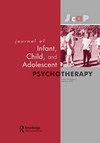否定与认识论策略在能动性发展中的相互作用
Q3 Psychology
Journal of Infant, Child, and Adolescent Psychotherapy
Pub Date : 2023-07-03
DOI:10.1080/15289168.2023.2221158
引用次数: 0
摘要
本文从发展的角度来看待否定。我们认为,在向能人的良性“是”的体现迈进的过程中,童年的“不”不同于青春期和青年期的“不”。在前者中,否定的“不”反映了一种服从/不服从的认识论策略,在后者中则反映了一种怀疑的策略。“不”在发展过程中的协商方式反映了儿童/青少年与其照顾者之间的重要相互作用,而照顾者最典型地占据的存在-关系地位是“不”是否定还是转变为否定的核心。为了说明我们的想法,我们提供了四个小插曲。本文章由计算机程序翻译,如有差异,请以英文原文为准。
The Interplay of Negation and Epistemological Strategies in the Development of Agency
ABSTRACT In this paper we look at negation from a developmental perspective. We propose that in the march toward the embodiment of the virtuous “Yes” of agency the “No” of childhood is different from the “No” of adolescence and young adulthood. In the former the “No” of negation reflects an epistemological strategy of obedience/disobedience and in the latter a strategy of wondering. How “No” is negotiated in development reflects an important interplay between the child/adolescent and their caregivers with the existential-relational position occupied most typically by the caregivers as central to whether the “No” can be one of negation or devolve into negativism. To illustrate our ideas we offer four vignettes.
求助全文
通过发布文献求助,成功后即可免费获取论文全文。
去求助
来源期刊

Journal of Infant, Child, and Adolescent Psychotherapy
Psychology-Clinical Psychology
CiteScore
1.70
自引率
0.00%
发文量
37
 求助内容:
求助内容: 应助结果提醒方式:
应助结果提醒方式:


